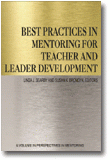
Best Practices in Mentoring for Teacher and Leader Development
Edited by:
Linda J. Searby, Auburn University
Susan K. Brondyk, Hope College
A volume in the series: Perspectives on Mentoring. Editor(s): Benjamin Kutsyuruba, Queen’s University.
Published 2015
Mentoring in educational contexts has become a rapidly growing field of study, both in the United States and internationally (Fletcher & Mullen, 2012). The prevalence of mentoring has resulted in the mindset that “everyone thinks they know what mentoring is, and there is an intuitive belief that mentoring works” (Eby, Rhodes, & Allen, 2010, p. 7). How do we know that mentoring works? In this age of accountability, the time is ripe for substantiating evidence through empirical research, what mentoring processes, forms, and strategies lead to more effective teachers and administrators within P‐12 contexts.
This book is the sixth in the Mentoring Perspectives Series, edited by Dr. Frances Kochan former Dean of the College of Education at Auburn University. This latest book in the series, co‐edited by Linda J. Searby and Susan K. Brondyk, brings together reports of recent research on mentoring in K‐12 settings for new teachers and new principals. The book has already garnered accolades from mentoring experts:
"You will want to add this high‐quality volume on mentoring to your library! What a terrific resource for teachers, leaders, administrators, and mentoring scholars alike. Having first‐hand knowledge of mentoring practices and programs for P‐12 teachers and administrators can help with the national need to retain teachers and principals through such means as excellent, proven methods, programs, and processes of mentoring" ~ Carol A. Mullen, Educational Leadership Professor, Virginia Tech, U.S. Fulbright Scholar; Kappa Delta Pi Presidential Commissioner
"This volume, Best Practices in Mentoring for Teacher and Leader Development, forwards principles of effective mentoring, including the role and importance of talk in mentoring, using tools that make mentoring talk more purposeful, analyzing practice, involving mentors in opportunities to share their practice, providing space for mentees to have a voice in mentoring conversations, and promoting learning at all levels as part of instructional leadership in schools. Much research is still needed to build a sense of urgency that mentoring can matter, and ideas promoted within this book can contribute to this important conversation." ~ Randi Nevins Stanulis, Professor, Department of Teacher Education, Michigan State University, and Director of Launch into Teaching.
"This book is a huge first step in a field where best practices have not yet been agreed upon, and it is sure to be a leading voice in research on teacher and principal mentoring. As such, this book helps to bring together a variety of beliefs, evidence, and practices in teacher and principal mentoring, and gives a clear pathway for others trying to establish best practices in their mentoring fields. For those in the K‐12 fields, and in all mentoring practices, this is a thought‐provoking, must‐read." ~ Nora Domínguez, International Mentoring Association, President and CEO
CONTENTS
Foreword, Frances Kochan. Book Introduction, Linda J. Searby and Susan K. Brondyk. Complexities and Possibilities in the Changing Landscape of K‐12 Teacher and Principal Mentoring, Susan K. Brondyk and Linda J. Searby. The Reciprocity of Mentoring in School/University Partnerships, Danielle V. Dennis and Audra K. Parker. Mentoring Within a Comprehensive Induction Program: Roles and Outcomes, Amanda R. Bozack. E‐Mentoring: Use of Reflection Rounds in Teacher Mentoring, Carmen Gloria Núñez, Verónica López, Bryan González, Carola Rojas, Evelyn Mujica, Evelyn Palma, and Cristina Julio. Face to Face, Online and Hybrid Mentoring for Inservice New Teachers, Ya‐Wen Cheng, Mark J. Volkmann, and Deborah L. Hanuscin. A Unique Model of Pre‐Service Teacher Mentoring, Elizabeth Doone and Karen Colucci. Crossing Borders on the Border: Implementing a Mentoring Network, Etta Kralovec and Laura Gail Lunsford. Moving Beyond One‐to‐One Mentoring: Collaborative Structures and Systems Thinking, Lara H. Hebert and Elizabeth A. Wilkins. Promising Practices for Developing Teacher Leaders in High Schools: The Principal’s Role, Tricia Browne‐Ferrigno, Amanda Perry Ellis, and Matthew Douglas Thompson. How an Assistant Principals’ Academy Evolved into Dynamic Peer Mentoring Experiences, D. K. Gurley and L. Anast‐May. Best Practices for Mentoring Urban Principals, Charles L. Slater and Constance Magee. Leaders Helping Leaders: Mentoring After Mentoring, John Daresh. A Collaborative Model for Supporting Beginning Principals: Consultant Coaching, Mary Bearden Martin and Linda J. Searby. Mentoring Mid‐Career Principals to Build Capacity for Change in Schools, Kenyae L. Reese, Jane Clark Lindle, Matthew R. Della Sala, Robert C. Knoeppel, and Hans W. Klar. A Summary of the Best Practices in Mentoring in P‐12 Education, Linda J. Searby and Susan K. Brondyk.
-
Paperback9781681232980
Web price: $45.04 (Reg. 52.99)
-
Hardcover9781681232997
Web price: $80.74 (Reg. 94.99)
- eBook9781681233000

- EDU000000 - EDUCATION: General
- EDU031000 - EDUCATION: COUNSELING: Career Guidance
- EDU014000 - EDUCATION: COUNSELING: Academic Development
-
 Across the Domains
Examining Best Practices in Mentoring Public School Educators throughout the Professional Journey
Across the Domains
Examining Best Practices in Mentoring Public School Educators throughout the Professional Journey
-
 Creating and Sustaining a Collaborative Mentorship Team
A Handbook for Practice and Research
Creating and Sustaining a Collaborative Mentorship Team
A Handbook for Practice and Research
-
 Mentoring at Minority Serving Institutions (MSIs)
Theory, Design, Practice, and Impact
Mentoring at Minority Serving Institutions (MSIs)
Theory, Design, Practice, and Impact
-
 Mentoring for the Professions
Orienting Toward the Future
Mentoring for the Professions
Orienting Toward the Future
-
 Mentoring for Wellbeing in Schools
Mentoring for Wellbeing in Schools
-
 More Than a Mentoring Program
Attacking Institutional Racism
More Than a Mentoring Program
Attacking Institutional Racism
-
 Uncovering the Cultural Dynamics in Mentoring Programs and Relationships
Enhancing Practice and Research
Uncovering the Cultural Dynamics in Mentoring Programs and Relationships
Enhancing Practice and Research

